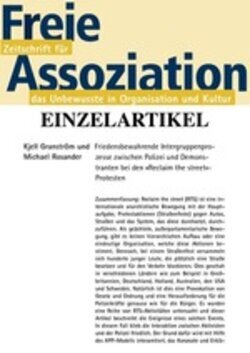13 Seiten, PDF-E-Book
Erschienen: November 2008
Bestell-Nr.: 21101
abonnieren
Kjell Granström & Michael Rosander
Friedensbewahrende Intergruppenprozesse zwischen Polizei und Demonstranten bei den »Reclaim the street«-Protesten (PDF)
Freie Assoziation 2008, 11(3), 51-63
Sofortdownload
Dies ist ein E-Book. Unsere E-Books sind mit einem personalisierten Wasserzeichen versehen,
jedoch frei von weiteren technischen Schutzmaßnahmen (»DRM«).
Erfahren Sie hier mehr zu den Datei-Formaten.
»Reclaim the street« (RTS) ist eine internationale anarchistische Bewegung mit der Hauptaufgabe, Protestaktionen (Straßenfeste) gegen Autos, Straßen und das System, das diese durchsetzt, durchzuführen. Die Ereignisse eines RTS-Events, bei dem die Interaktion zwischen Aktivisten und der Polizei friedlich blieb, werden dargestellt. Der Grund dafür wird mit Hilfe eines theoretischen Modells interpretiert, das Konzepte und Erklärungen für dynamische Prozesse bei Massenereignissen mit sich gegenüberstehenden Gruppen anbietet. Es zeigt sich, dass die von den Polizisten ergriffenen Maßnahmen dabei genauso wichtig sind wie das Verhalten der Demonstranten. Das bedeutet auch, dass Polizisten durchaus der Grund für Ausschreitungen sein können.
Abstract:
Reclaim the street (RTS) is an international anarchistic movement with a primary task to arrange protest actions (street parties) against cars, roads and the systems that pushes them. As an outlawry and extra-parliamentary activity there is no hierarchical superstructure or intelligible organization that govern these activities. Nevertheless, a street party can assemble hundreds of young people who suddenly occupy and close off a street to traffic. That has happened in several countries such as UK, Germany, Holland, Australia, USA, and Sweden. Certainly, this is a provocation to law and order and a challenge to police forces as well as citizens. A number of RTS actions have been studied and this paper accounts for the happenings at such an event. In this case the interaction between activists and the police turned out peaceful. The reason for that is interpreted by use of the APP model, that offers concepts and explanations for dynamic processes in mass events with confronting groups (as police officers and a group of demonstrators). The results indicate that the measures taken by the police officers are as much as important as the behaviour of the demonstrators, i.e. police officers can fairly well be the reason for riots.
Stichworte: Demonstrationen (Protest), Unruhen, Gewalt, Intergruppendynamik, Polizei, Aktivismus
Keywords: Social Demonstrations, Riots, Violence, Intergroup Dynamics, Police Personnel, Activism
Abstract:
Reclaim the street (RTS) is an international anarchistic movement with a primary task to arrange protest actions (street parties) against cars, roads and the systems that pushes them. As an outlawry and extra-parliamentary activity there is no hierarchical superstructure or intelligible organization that govern these activities. Nevertheless, a street party can assemble hundreds of young people who suddenly occupy and close off a street to traffic. That has happened in several countries such as UK, Germany, Holland, Australia, USA, and Sweden. Certainly, this is a provocation to law and order and a challenge to police forces as well as citizens. A number of RTS actions have been studied and this paper accounts for the happenings at such an event. In this case the interaction between activists and the police turned out peaceful. The reason for that is interpreted by use of the APP model, that offers concepts and explanations for dynamic processes in mass events with confronting groups (as police officers and a group of demonstrators). The results indicate that the measures taken by the police officers are as much as important as the behaviour of the demonstrators, i.e. police officers can fairly well be the reason for riots.
Stichworte: Demonstrationen (Protest), Unruhen, Gewalt, Intergruppendynamik, Polizei, Aktivismus
Keywords: Social Demonstrations, Riots, Violence, Intergroup Dynamics, Police Personnel, Activism
Kjell GranströmS. 7–13Soziale Identität und Massenereignisse (PDF)
Freie Assoziation 2008, 11(3), 7-13Ingrid HylanderS. 15–32Massenbewegungen, Massenproteste und Soziale Identität (PDF)
Freie Assoziation 2008, 11(3), 15-32Gunilla Guvå & Ingrid Hylander S. 33–49Aggravation und Friedensprozesse (PDF)
Freie Assoziation 2008, 11(3), 33-49Kjell Granström & Michael Rosander S. 51–63Friedensbewahrende Intergruppenprozesse zwischen Polizei und Demonstranten bei den »Reclaim the street«-Protesten (PDF)
Freie Assoziation 2008, 11(3), 51-63Gunilla GuvåS. 65–81Hilfe oder Selbstkontrolle - über Intragruppenprozesse bei der Polizei bei Massenereignissen (PDF)
Freie Assoziation 2008, 11(3), 65-81Stephan Hau & Johan Näslund S. 83–104Spiel-Räume: Symbolische Prozesse zwischen Gruppen bei der Fußballweltmeisterschaft 2006 (PDF)
Freie Assoziation 2008, 11(3), 83-104
Freie Assoziation 2008, 11(3), 7-13Ingrid HylanderS. 15–32Massenbewegungen, Massenproteste und Soziale Identität (PDF)
Freie Assoziation 2008, 11(3), 15-32Gunilla Guvå & Ingrid Hylander S. 33–49Aggravation und Friedensprozesse (PDF)
Freie Assoziation 2008, 11(3), 33-49Kjell Granström & Michael Rosander S. 51–63Friedensbewahrende Intergruppenprozesse zwischen Polizei und Demonstranten bei den »Reclaim the street«-Protesten (PDF)
Freie Assoziation 2008, 11(3), 51-63Gunilla GuvåS. 65–81Hilfe oder Selbstkontrolle - über Intragruppenprozesse bei der Polizei bei Massenereignissen (PDF)
Freie Assoziation 2008, 11(3), 65-81Stephan Hau & Johan Näslund S. 83–104Spiel-Räume: Symbolische Prozesse zwischen Gruppen bei der Fußballweltmeisterschaft 2006 (PDF)
Freie Assoziation 2008, 11(3), 83-104

